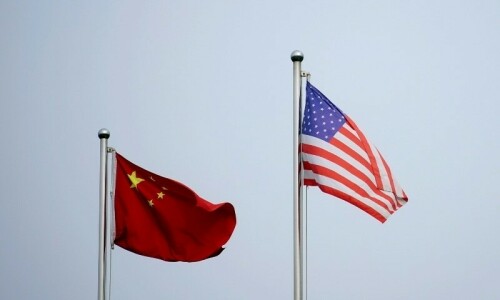Imagine trying to cross the border on a rickety donkey cart, with nothing but a counterfeit passport in your pocket! You’d be up against serious odds, which are exactly what stares Zinda Bhaag’s three protagonists — Khaldi, Chitta and Taambi — in the face as they spend days and nights dreaming of leaving their seedy mohalla for more prosperous (and foreign) pastures. The underhanded dunky system takes them through a perilous passage that has failed more people than it has successfully served. Overcoming these odds is what Zinda Bhaag is all about.
What makes ZB unique is its execution, its humorous repartee that coughs up every nuance in the highly colourful Punjabi dictionary. It’s blunt, it’s whimsical, and as with the theatre of the absurd, it depends on comedy to make desolation and sadness more palatable. The film lures you in with laughter and leaves you with grief, as there is very little to celebrate in the Land of the Pure. Let there be no mistake; this is no jolly story.
That doesn’t mean it isn’t well made. Meenu Gaur and Farjad Nabi’s powerful direction makes Khaldi (Khurram Patras), Chitta (Salman Ahmed) and Taambi (Zohaib) extremely convincing as corruptible yet well-meaning lafangas (there is no other word to describe them). And for once, a film made in Lahore doesn’t look as if it’s shot in Delhi. The characters, acts, sequences and songs are truly authentic. Its native language is Punjabi, a warning for those who have language barriers.
“What are you going to do with an empty bottle?” Khaldi asks his father as the appalled old man walks into a boozing session he’s having with his friends on the rooftop. “Grow money plants?”
Since almost every middle-class family in Lahore has a money plant growing out of a green bottle, it is one-liners like this that keep ZB connected to our reality. No one drinks, but everyone has a green bottled plant in the drawing room! These references punctuate the film and keep your interest afloat. When the story picks up, it takes a turn from the vibrancy of youth and love, to the dark shadows of desperation and poverty.
Zinda Bhaag is anecdotal, constantly jumping from interesting sequences and characters. There is Pehlvan (played by Naseeruddin Shah), the neighbourhood godfather who believes it is okay for Taambi to go to jail in Ukraine for two years but not to forget calling his family.
He has strange values that are overshadowed by his weird eyebrow threading and ice cream slurping habits. He loves to break into dramatic stories, twisting some sort of fateful moral lesson into each one. The film opens at Mahboob Alam’s funeral, where Pehlvan shares how Booba left through the dunky system, got to France via Turkey, and managed to open a café called La Booba there. It’s all very entertaining.
Naseeruddin’s Pehlvan is ostensibly a marketing tool (he is centre stage on the publicity poster) but he doesn’t serve the purpose too believably. A film like Khuda Kay Liye, for example, needed a Naseeruddin Shah to represent the progressive mullah and pitch him to the world. But Shah’s international acclaim is wasted in his role in ZB. He doesn’t work as Pehlvan, despite his orange hair and decent Punjabi dialogue delivery. One feels that a local villain, a Shafqat Cheema, would have been better.
Amna Ilyas plays Khaldi’s love interest, Rubina, who sells a homemade soap called FaceLook to make a living. Ilyas doesn’t exactly botch things up but her look is too Karachi-urban to characterise the Lahori, mohalla-bred Rubina. The Billo-Rano types, fair-skinned and robust, are your quintessential Lahori girls. It is strange how Rubina does not speak Punjabi (as everyone else does) and is well-versed in English and fancy terms such as ‘organic soap’, when even the Student Visa Officer refers to standing ovation as “standing aviation”.
Let there be no doubt that ZB is a well-planned, well-made film — one certainly worthy of an Oscar nod. It is a matter of pride that we have a film worthy of consideration after 50 years. However, for people seeking pure entertainment, it may not be a film they’re too comfortable with.
Pakistan’s re-entry into cinema is understandably issue-based; upcoming films like Waar, Operation 021 and Moor are not going to be a walk in the park; Khuda Kay Liye and Bol were just as, if not more, intense. One can understand the need for activism in these times we live in but meanwhile, every now and then, it would be refreshing to step into the cinema for some light-hearted love, romance and fantasy. One does hope for a Pakistani film that doesn’t necessarily toe a social line, navigate with a moral compass or perpetrate a cause. This is a welcome step in that direction.














































